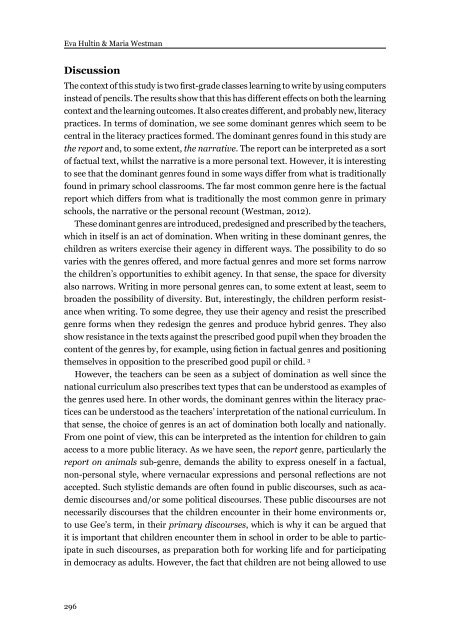Download issue - Umeå universitet
Download issue - Umeå universitet
Download issue - Umeå universitet
You also want an ePaper? Increase the reach of your titles
YUMPU automatically turns print PDFs into web optimized ePapers that Google loves.
Eva Hultin & Maria Westman<br />
Discussion<br />
The context of this study is two first-grade classes learning to write by using computers<br />
instead of pencils. The results show that this has different effects on both the learning<br />
context and the learning outcomes. It also creates different, and probably new, literacy<br />
practices. In terms of domination, we see some dominant genres which seem to be<br />
central in the literacy practices formed. The dominant genres found in this study are<br />
the report and, to some extent, the narrative. The report can be interpreted as a sort<br />
of factual text, whilst the narrative is a more personal text. However, it is interesting<br />
to see that the dominant genres found in some ways differ from what is traditionally<br />
found in primary school classrooms. The far most common genre here is the factual<br />
report which differs from what is traditionally the most common genre in primary<br />
schools, the narrative or the personal recount (Westman, 2012).<br />
These dominant genres are introduced, predesigned and prescribed by the teachers,<br />
which in itself is an act of domination. When writing in these dominant genres, the<br />
children as writers exercise their agency in different ways. The possibility to do so<br />
varies with the genres offered, and more factual genres and more set forms narrow<br />
the children’s opportunities to exhibit agency. In that sense, the space for diversity<br />
also narrows. Writing in more personal genres can, to some extent at least, seem to<br />
broaden the possibility of diversity. But, interestingly, the children perform resistance<br />
when writing. To some degree, they use their agency and resist the prescribed<br />
genre forms when they redesign the genres and produce hybrid genres. They also<br />
show resistance in the texts against the prescribed good pupil when they broaden the<br />
content of the genres by, for example, using fiction in factual genres and positioning<br />
themselves in opposition to the prescribed good pupil or child. 3<br />
However, the teachers can be seen as a subject of domination as well since the<br />
national curriculum also prescribes text types that can be understood as examples of<br />
the genres used here. In other words, the dominant genres within the literacy practices<br />
can be understood as the teachers’ interpretation of the national curriculum. In<br />
that sense, the choice of genres is an act of domination both locally and nationally.<br />
From one point of view, this can be interpreted as the intention for children to gain<br />
access to a more public literacy. As we have seen, the report genre, particularly the<br />
report on animals sub-genre, demands the ability to express oneself in a factual,<br />
non-personal style, where vernacular expressions and personal reflections are not<br />
accepted. Such stylistic demands are often found in public discourses, such as academic<br />
discourses and/or some political discourses. These public discourses are not<br />
necessarily discourses that the children encounter in their home environments or,<br />
to use Gee’s term, in their primary discourses, which is why it can be argued that<br />
it is important that children encounter them in school in order to be able to participate<br />
in such discourses, as preparation both for working life and for participating<br />
in democracy as adults. However, the fact that children are not being allowed to use<br />
296

















